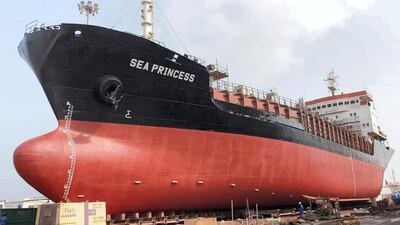An investigation started after an Indian seafarer was found dead aboard a tanker off the coast of Khor Fakkan in Sharjah on Saturday.
The body of the 23-year-old was found by crew mates in the boiler room as the vessel travelled from Sharjah to Alang, in Gujarat, India, where it is to be scrapped.
Owned by Global Tankers Put of India, and operated in the UAE by Prime Tankers, the Mt Sea Princess has 13 crew.
David Hammond, chief executive of Human Rights at Sea, a UK-registered charity that was contacted by the ship's crew, said: "It is with great sadness that we report the tragic and premature death of a young seafarer on-board a Cook Islands-flagged vessel, the Mt Sea Princess."
“The general alarm was raised by the master after fellow crew members could not locate the seafarer.
“The crew conducted a full vessel search and the deceased was found the boiler room. The master checked for a pulse, but did not find one."
The sailor had been on the vessel for 13 months, according to crew members.
His death was suspected as a suicide.
It is believed the crew were nearing the end of their contracts as the 28-year-old vessel had been sold for scrap to Al Garhoud General Trading of Dubai on January 6.
The tanker, used for transporting asphalt and bitumen, left Sharjah two week ago and was anchored in international waters off Khor Fakkan when the death was reported.
The Indian Consulate General in Dubai issued a request to board the vessel and recover the body.
Officials were told they required permission from prosecutors and police as the ship was not in territorial waters.
“Public prosecution has refused the request as the death happened in the outer water area of Khor Fakkan," a consulate spokesman said.
"The body will only be allowed to enter Khor Fakkan if the death happens in its waters."
____________________
Crew of stranded tanker tell of 43 months at sea
____________________
The consulate said prosecutors ordered the vessel to continue on its journey, but the crew would not carry on with the body aboard.
Jugwinder Singh Brar, managing director of Prime Tankers, said he was in contact with the sailor's family.
"The ship had been sold and was on its last voyage, unfortunately this young boy has also taken his last journey," he said.
"It is very sad. He had taken lunch with his colleagues and appeared to be in a good mood. A few hours later, he went missing.
“The ship would have been back in India within four days."
The Sea Princess is one of many tankers anchored off the coast of the UAE.
It has been a challenging 12 months for the industry with the pandemic limiting crew changeovers, leaving some stuck at sea after the end of their contracts.
One of those vessels, the Mt Iba, broke its anchor last week and washed ashore on Umm Al Quwain beach. Its five-man crew had been stuck at sea for three-and-a-half years after the ship's owner suffered financial problems.
“There is a rather large number of abandoned vessels and crew waiting for their next employment,” Jasmin Fichte, a solicitor specialising in maritime law at Fichte & Co in Dubai, said.
“But there is only so much the UAE can do as these ships fall under the law of their respective flag state.
“Why this particular seafarer was not able to seek the necessary help and support is unclear, so we will need to await the outcome of the investigation.”
According to the UN International Labour Organisation’s Abandonment of Seafarers database, the Middle East accounts for about 80 of the 200 active cases of abandonment.
In many cases, crew have been aboard ships for more than a year because of Covid-19 restrictions.
“While my heart goes out to the family of the deceased, it is pivotal to have a thorough investigation conducted by the UAE prosecution to find ways to prevent further tragic losses,” Ms Fichte said.
“In far too many cases crew have not been paid, and laid-up vessels are not taken care of, meaning necessary maintenance work cannot be carried out, food supplies are scarce and there is not enough bunker [fuel] on board to allow the vessel to use electricity.
“The immense pressure the crew is under is unimaginable.”









